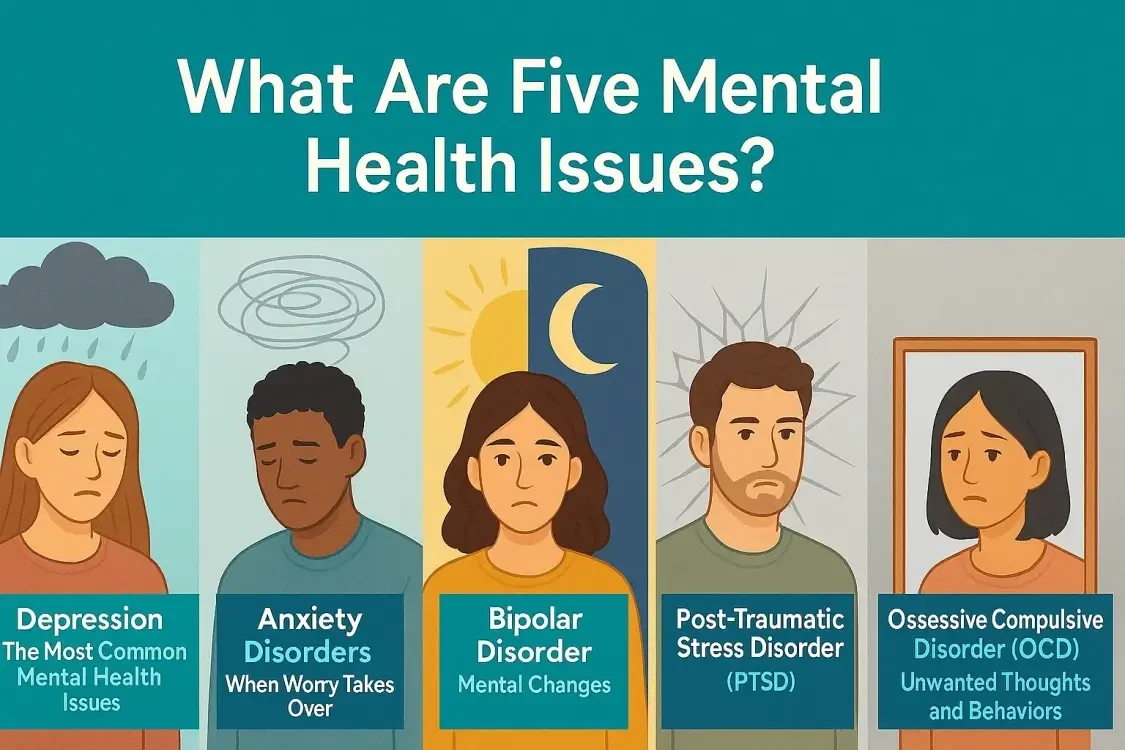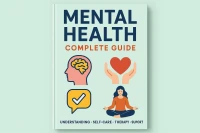What are the most common mental health issues affecting millions of people worldwide?
The five main mental health conditions are:
- Depression
- Anxiety disorders
- Bipolar disorder
- Post-traumatic stress disorder (PTSD)
- Obsessive-compulsive disorder (OCD)
Knowing about these mental health disorders can help reduce stigma. It helps us spot when someone might need support. Also, it promotes mental health awareness in our communities.
Important Disclaimer:
This article is for informational purposes. It is not a replacement for professional diagnosis or treatment. If you or someone you know has mental health issues, please talk to a qualified healthcare professional for help.
Understanding Mental Health
Mental health is key to wellness. It impacts how feel and act every day. The World Health Organization defines mental health as a state of well-being. It means people can see their strengths. They can manage daily stress, work effectively, and support their communities.
Everyone experiences emotional ups and downs as normal parts of life. Mental health challenges in daily life are different from normal ups and downs in key ways. Mental health conditions usually have symptoms that last a long time. They can disrupt daily life, cause a lot of distress, and often don’t get better with common coping methods.
Mental health awareness helps everyone. It reduces stigma around mental health issues. It also helps people see when they or their loved ones need support. Plus, it encourages early intervention, which leads to better outcomes. Additional educational resources provide further insights on mental health topics.
Depression
Depression is a common mental health issue. It affects people of all ages and backgrounds around the world. Depression is defined by persistent sadness or feelings of emptiness, according to the National Institute of Mental Health. These feelings last for at least two weeks and disrupt daily activities. Depression is different from temporary sadness. It causes a long-lasting low mood that doesn’t change, even when things get better.
Common mental disorders, like depression, can show several symptoms.
These include:
- Constant feelings of sadness or emptiness.
- Losing interest in activities you once enjoyed.
- Changes in appetite and weight.
- Sleep problems.
- Low energy.
- Trouble concentrating.
- Feelings of worthlessness.
Physical symptoms often come with emotional changes. You might experience unexplained aches, headaches, or digestive issues.
The severity varies significantly among individuals. Some people manage daily tasks despite inner struggles. Others feel overwhelmed by simple activities.
If you're feeling low for a long time, talk to a licensed mental health professional. This includes psychiatrists, psychologists, or counselors. Community mental health centers use sliding fee scales for services. Many employers also offer employee assistance programs. These programs include confidential counseling sessions.
Research shows that several approaches help with well-being, along with professional treatment.
These include:
- Regular physical activity
- Consistent sleep schedules
- Connecting with supportive friends and family.
However, these practices complement rather than replace professional treatment when needed.
Anxiety Disorders
Anxiety disorders are the most common mental health issues. They affect about 30% of adults at some point. Anxiety is common for everyone at times. However, anxiety disorders mean constant, excessive worry that disrupts daily life.
Understanding mental health includes recognizing that anxiety disorders encompass several distinct conditions. Generalized Anxiety Disorder involves persistent, excessive worry about various topics. Social Anxiety Disorder causes strong fear in social situations. This fear comes from concerns about being judged. Panic Disorder involves recurrent, unexpected panic attacks with intense physical symptoms. Specific Phobias involve intense fear of particular objects or situations.
Mental health challenges from anxiety disorders can impact daily life. They affect work performance, relationships, and even physical health. Many people experience sleep disturbances, digestive problems, headaches, and muscle tension. The educational understanding recognizes these conditions as treatable with appropriate professional support. Many communities offer anxiety support groups where people share experiences and coping strategies.
Research-backed methods for education include:
- Deep breathing exercises.
- Progressive muscle relaxation
- Regular physical activity
- Limiting caffeine and alcohol, which can worsen symptoms.
Bipolar Disorder
Bipolar disorder includes clear mood swings. These swings go from deep depression to manic or hypomanic highs. These mood changes are more intense and last longer. They also impact how well a person functions, unlike normal emotional ups and downs. The National Institute of Mental Health classifies types based on how episodes occur and their severity.
During depressive episodes, people feel low, tired, and have trouble focusing. They may also notice changes in sleep and appetite. Manic episodes include an elevated or irritable mood. They also bring increased energy, racing thoughts, and rapid speech. People may make impulsive decisions and engage in risky behaviors. Between mood episodes, many people experience periods of stable mood.
Bipolar disorder shows that people need continuous treatment, according to mental health experts. This includes both medication management and psychotherapy. Psychiatrists manage medications that stabilize mood. Therapists teach coping strategies and help identify warning signs of mood episodes.
Educational resources stress the importance of daily routines. Disrupted sleep can lead to mood episodes. Support groups for bipolar disorder bring together those with similar experiences. They offer practical coping strategies and a sense of community.
Post-Traumatic Stress Disorder (PTSD)
PTSD symptoms and awareness are rising. Research shows this condition can develop after different traumatic events. Mental health experts say PTSD occurs when someone has intense reactions after experiencing real or threatened death, serious injury, or violence.
Traumatic experiences can include:
- Military combat
- Natural disasters
- Serious accidents
- Violent assaults
- Witnessing violence
To recognize mental health problems like PTSD, focus on four main symptom categories. Intrusive memories include unwanted, distressing memories, nightmares, and flashbacks. Avoidance involves steering clear of trauma reminders. Negative changes in thinking include persistent, negative beliefs and emotions. Heightened reactivity involves being easily startled, feeling constantly on guard, and experiencing irritability.
Licensed therapists specializing in trauma provide evidence-based treatments tailored for PTSD. Veterans Affairs offers specialized programs for military veterans. Community mental health centers often have trauma-focused programs. Support groups designed for trauma survivors provide opportunities for peer connection.
Educational resources suggest grounding techniques help during flashbacks by reconnecting with present surroundings. Regular physical activity helps manage hyperarousal symptoms. However, professional guidance is essential for effective management of PTSD.
Obsessive-Compulsive Disorder (OCD)
OCD and mental health involve two main components: obsessions and compulsions. Obsessions are unwanted thoughts that cause anxiety, according to the International OCD Foundation. Compulsions are repetitive behaviors people feel driven to perform in response to obsessions.
Mental health disorders explained in educational contexts describe common OCD themes. Contamination obsessions involve fears about germs, often leading to excessive cleaning. Harm obsessions involve unwanted thoughts about causing harm. People may feel the need to check locks over and over. Symmetry obsessions involve distress when objects lack a perfect arrangement. Religious obsessions create distress about moral wrongdoing.
OCD can cause major mental health challenges in daily life. Compulsions often consume hours each day. Work performance suffers when intrusive thoughts distract from tasks. Relationships strain when symptoms involve family members in rituals. The exhaustion from the relentless battle with intrusive thoughts affects functioning.
Licensed mental health professionals trained in evidence-based OCD treatments provide effective interventions. Exposure and Response Prevention therapy shows strong research support. The International OCD Foundation offers educational resources and treatment provider directories. Support groups connect people with shared experiences and reduce isolation.
How Mental Health Issues Can Overlap
Common mental health problems often share similar symptoms, making professional evaluation essential. For example, the difference between anxiety and depression can be unclear. Both conditions usually include sleep issues, trouble concentrating, and fatigue. Many people experience multiple conditions simultaneously, called comorbidity.
Educational understanding recognizes overlapping patterns as normal. About 50% of people with one condition will also have another later on. This overlap demonstrates mental health complexity and the importance of comprehensive professional evaluation.
Types of mental health disorders need professional expertise to be accurately diagnosed. Clinicians conduct thorough assessments. They examine symptom patterns, how long symptoms last, and their effects on daily life. They also consider personal history. Self-diagnosis can be misleading due to symptom overlap and individual variation.
Seeking Help and Resources
Signs that you might need professional help for mental health issues include:
- Symptoms last for more than a few weeks.
- Major disruptions in work or relationships.
- Thoughts of self-harm.
- Using substances to manage emotions.
Licensed mental health professionals are:
- Psychiatrists
- Psychologists
- Licensed clinical social workers
- Professional counselors
Crisis Resources: If you or someone is in crisis, call or text 988. If you're outside the U.S., reach out to local authorities. This is the U.S. Suicide and Crisis Lifeline. You can also visit findahelpline.com for international help. Emergency services (911 in the U.S.) provide immediate assistance for life-threatening situations.
Mental health support resources include:
- Community mental health centers
- University counseling centers
- Employee help programs
- Support groups from organizations like NAMI.
These options help people find the support they need.
Educational resources from the National Institute of Mental Health and Mental Health America provide trustworthy, evidence-based information.
Final Thoughts
Mental health awareness creates communities where people feel comfortable seeking help without shame. Understanding that mental health disorders are treatable encourages people to seek help when needed. Learning about five key mental health conditions helps spot challenges early. This way, intervention can be more effective.
Professional treatment helps most people with common mental health problems improve significantly. Recovery varies for everyone. Some may completely resolve symptoms, while others manage them well and live life to the fullest. Both are valid recovery experiences.
Stigma fades when communities realize that mental health issues impact everyone, regardless of their background. Showing empathy and support creates environments where seeking help feels safe. When people learn about mental health and share facts, they help ensure it gets as much attention as physical health.



Comments